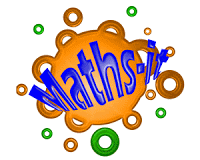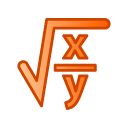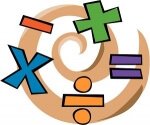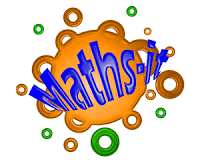#371 - Simple Maths Puzzle
In a certain country ½ of 5 = 3. If the same proportion holds, what is the value of 1/3 of 10 ?

4
5/2 = 3 and 10/3 = x
(10/3)/(5/2) = 20/15 = 4/3
So x/3 = 4/3
x=4
In a certain country ½ of 5 = 3. If the same proportion holds, what is the value of 1/3 of 10 ?

4
5/2 = 3 and 10/3 = x
(10/3)/(5/2) = 20/15 = 4/3
So x/3 = 4/3
x=4
Charley Smalleash treats his best girl to a trolley ride, but on account of his limited resources they plan to walk back, so, if the car goes at the rate of nine miles an hour and they can walk at the rate of three miles an hour, how far could they ride if they must be back in eight hours?

Charley Smalleash and his best girl could trolley three times as fast as they could walk. Therefore, three-quarters of their outing time was spent in walking, and but one-quarter in riding, since they had to walk back.
They rode for two hours, going 18 miles, and walked back in six hours, thus consuming their eight hours.
You have 1023 apples and 10 bags. You have to distribute these lemons in these 10 bags in any way you choose. But when I ask for a certain number of lemons you have to give them in terms of bags without transferring the lemons from other bags. How do you distribute the lemons?

Starting with 1 apple in a bag, each bag contains double the number of apples as the previous bag. ie 1,2,4,8,16,32,64,128,256,512. That way whatever number of apples I would ask for you would just add up the bags to equal the number asked.
How can I get the answer 24 by only using the numbers 8,8,3,3.
You can use the main signs add, subtract multiply and divide.

1) 8/(3-(8/3))
= 8/(1/3)
= 24
2)((8 x 3!)/3)+8
= ((8 × 3 × 2 × 1)/3)+8
= (48/3)+8
= (16)+8
= 24
3)(3!/)*8
4)(8-3)!/(8-3)
( × )!
( + )!
√(8×8×3×3)
8+(8×(3!/3))
((√(8+8) × (3/3))!
√(8+8) × (3+3)
(log base(3!/3) of 8) × 8
((log base(3!/3) of (8+8))!
I am thinking of a 6-digit number. The sum of the digits is 43.
And only two of the following three statements about the number are true:
(1) it's a square number,
(2) it's a cube number, and
(3) the number is under 500000.

Only Statements 1 and 3 are true. the number is 499849.
7072 = 499849
499849<500000
The Puzzle: A girl, a boy, and a dog start walking down a road.
They start at the same time, from the same point, in the same direction.
The boy walks at 5 km/h, the girl at 6 km/h.
The dog runs from boy to girl and back again with a constant speed of 10 km/h. The dog does not slow down on the turn.
How far does the dog travel in 1 hour?
10km
Speed us 10km/h
Using the digits 1 up to 9, two numbers must be made. The product of these two numbers should be as large as possible. All digits must be used exactly once. Which are the requested two numbers. ?
The digits of the requested two numbers obviously form descending sequences. Furthermore, if you have two pairs of numbers with equal sums, the pair of which the numbers have the smallest absolute difference, is the one of which the numbers have the largest product. Using this knowledge, the two numbers can easily be constructed by placing the digits one by one, starting with 9 and ending with 1:
9
8 -> 96
87 -> 964
875 -> 9642
8753 -> 9642
87531
Conclusion: the requested two numbers are 9642 and 87531 (and the product of these two numbers is 843973902).
In the addition below, all digits have been replaced by letters. Equal letters represent equal digits and different letters represent different digits.
ABCABA
BBDCAA
ABEABB
ABDBAA
------- +
AAFGBDH
What does the complete addition look like in digits?
The complete addition looks as follows:
167161
664711
162166
164611
------- +
1158649
There is one four-digit whole number n, such that the last four digits of n2 are in fact the original number n
Looking at the last digit, the last digit must be either 0, 1, 5 or 6.
Then looking at the last two digits, the last two digits must be either 00, 01, 25 or 76.
Then looking at the last three digits, the last three digits must be either 000, 001, 625 or 376.
Then looking at the last four digits, the last four digits must be either 0000, 0001, 0625 or 9376.
Out of those, only 9376 is a 4 digit number
An express train takes 3 seconds to enter tunnel which is 1 km long.
If it is traveling at 120 km an hour, how long will it take to pass completely through the tunnel
The train takes 30 seconds to travel 1 km, plus 3 seconds for the complete train to pass any point, making a total of 33 seconds.